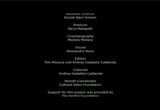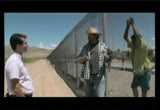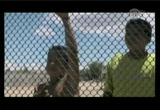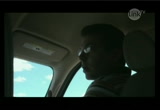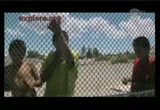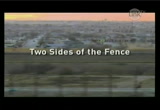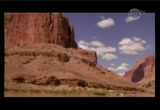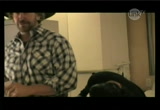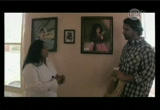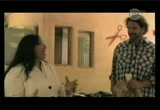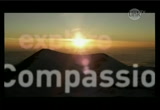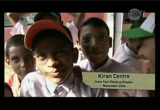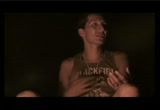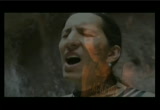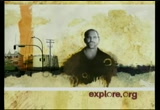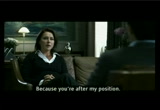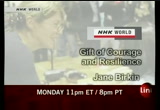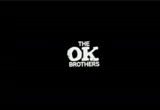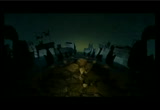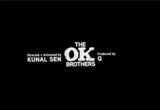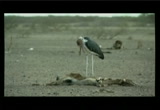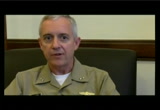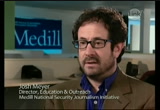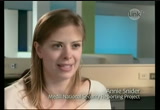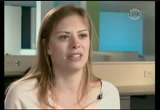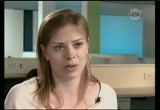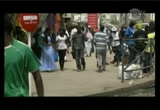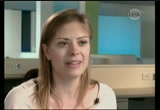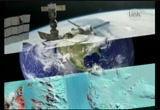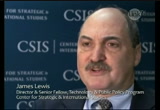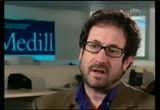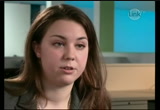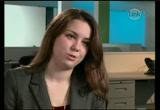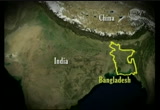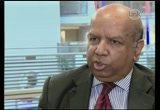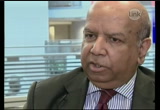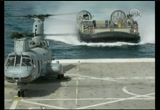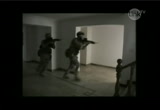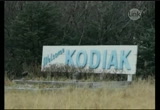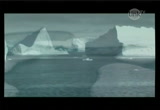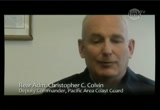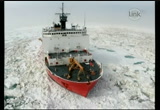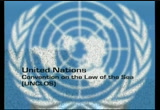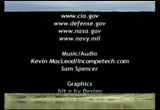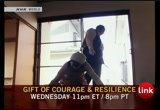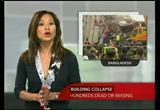tv Earth Focus LINKTV August 4, 2013 3:00pm-4:01pm PDT
3:01 pm
>> first word is hola. como estas. there it is, two different countries touching. there is border patrol. will they be alarmed that we are out here? >> they may think we're passing something. >> here is a new mexico. here is old mexico. >> hola. >> hola. look at this, it is like we're both in prison. so interesting. what is kind of funny is you have border patrol approach to,
3:02 pm
and i feel nervous even though i am not breaking the law. i just wanted to say hello. >> what is your name? >> greg. gregorio. so this is part of juarez. which country would you rather live in, mexico or america? he said he would like to live in the united states. he said, we are poor. >> [speaking foreign language] >> he said there's an economic crisis in mexico. he said that they kill a lot of people. he said they will pick you up in a big white suv like the one we are driving and will cover your mouth and take you away.
3:03 pm
he asked me if there were killers over here. this is one of the poorest neighborhood in the world, and this is separated by a fence. a lot of your family or friends tried to cross over the border illegally? why do they cross over? to be over here? ah, to work. you always hear about the loss of jobs. they are taking jobs people do not want. they shut off at the border and expel everybody from the country, that would kill our industries, kill our farmers. >> once they come over, do they want to come back home or do they want to stay?
3:04 pm
they want to stay on this side forever. >> some come up here and work a year are two and go back. some go back every two years. now i am hearing people just do not go back. every time, it is a risk. on the one hand, you want to have a strong border. then you talk to your constituents and they are scared. you want to help them, too. you want to be sympathetic to the people coming here. people who want jobs, want to feed their families. >> what do you kids want to be when you grow up? he says he wants to be a cop. he wants to be a lawyer. you can be a lawyer. that is lucky.
3:05 pm
>> lucky. >> they like your dog. they say it is really big and huge. lucky at the border, spreading it love. >> lucky, lucky. [whistles] >> ahh. [howling] >> the call of lucky. >> adios, lucky. adios. >> i do not think anyone naturally wants to leave their home. just the luck of the drop which side of the fins we're born on -- like of the draw which side of the fence we are born on.
3:06 pm
>> the hoop dance is part of the nine-night healing ceremony called the fire day and spirit that is only conducted during the wintertime, but this portion is a lot to be seen by the public. today, we're sharing that danced to express that our culture is still alive. >> we're fortunate that we're able to speak our language and have our ceremonies and perform our dances. we carry on sunday that is very special, something that is sacred, the knowledge, the information that is connected to this planet, everything that is here -- we carry on something that is a very special.
3:07 pm
3:08 pm
>> my name is mary carter, executive director of the cultural center. our dream is to be the springboard for women to obtain their desired goals. >> i think i have two shirts on. that does not count. [laughter] >> we have a three-prong approach with education and personal development, economic self-sufficiency.
3:09 pm
we urge them to become u.s. citizens so they can participate in the political context, because they need to feel like they will be receptive to the community. people taking the citizenship test actually know more about the united states than actual citizens. [laughs] because they have to study it so much. >> this is made out of tires -- >> they need to use the more cheaply available materials. they participate in the construction, training, and the educational pledged lasts for a year. [inaudible] now it is all of southern new mexico. the participants range in age from 17 to 85. claudia is also part of the
3:10 pm
border network for rights. she is an advocate, so she has pass it -- a class is where she provides that information and educates people on their rights. >> [speaking foreign language] >> she still goes out to the community as part of being advocate for human rights. a lot of people ask questions in reference to certain situations, and they ask in the third person just to ensure he or she himself is not so good that can get into a bad situation with immigration. it is still there. it is something they live with. that even goes for people that are residents. people do not know. everybody would rush to become a citizen. you have to do the test. >> right.
3:11 pm
>> people that migrated to the united states, especially from mexico, it is because they're looking for a better way of life for their family. mexico does not offer well- paying jobs. a lot of families make their way over here and send the money back to sustain their families. eventually, they do become a resident. they plan for the entire family to come because of the way of life. it is finding the american dream. you'd be surprised that most immigrants, the american dream is starting a business, to be able to economically sustain themselves for future generations. >> i do not think my waist is a 42, by the way, just for the record. >> i am member of the hopi tried
3:12 pm
and was born into the eagle clan. i live in arizona on the hopi preservation. i am a glass blower, a published poet, and a kochina doll-carver. my professional training is in education. when you consider glassblowing, which is the class that i teach, you see a number of tools here. you see e equipment here that are totally foreign to our culture, so there's no word for certain things. so this becomes the challenge for me. what vocabulary could i develop in the hopi language whereby we could blow glass which is a totally nontraditional, for and medium which is still used to
3:13 pm
communicate. i look to kochinas to give me ideas to put into a glass so that i can share the revisions of the spirit of life but also the visions of what it is to bring into fruition something that is deep inside of me. kochinas, in a general sense, are the spirit aspects of the hopi reality. so talking about the environment. when we talk about kochina spirits, we're talking about the spirit aspects of everyday objects. things that we have in the human experience when we talk about
3:14 pm
hopi, the plants, the birds, the insects, those natural forces. the clouds, the moon, the stars. they all have a spirit essence. these are the kachinas. how we look at things culturally is we work glass, just as a potter woodwork the clay or a farmer works the field. we work the glass. we're transforming it for the benefit of someone else.
3:15 pm
>> explore documents the great works of the inspirational leaders of the world. >> they practice philosophies. practice scripture. >> through on-site visits to places like darfur, india, hawaii, and the arctic, explore it encourages people to discover the beauty of things. >> this is a mother and daughter. always a little unusual because she has been with her mother for five to six years. >> here, we can be free. he can see what ever he wants and he can say whatever he wants, and nobody will laugh at him.
3:16 pm
to me, it is very important to have some time off. [laughs] >> explore's multimedia library has over 250 sure documentary films, -- short documentary films, photo galleries, and interviews. >> but it has to work with kids and somebody has to do prevention, keep kids from joining gangs and somehow keep them connected to loving, caring adults who pay attention. >> [indiscernible] machismo. >> all you have to do is look at the features in you see lot of human characteristics, it genetically 98.67% the same as most great apes.
3:17 pm
>> the explorer is a new concept that combines philanthropy, travel, and learning, led by charles with support from the annenberg foundation. it's the explore talks about missions to identify and document the great works of nonprofit organizations through films and photography. >> how has music shave your life? >> that is the first thing i fell in love with. >> what is the key to living a happy life? >> [speaking foreign language] [chanting]
3:18 pm
>> for people, the ones who sing the songs, they are the medicine people and the healers. there is a lot of power within a voice, and it can be utilized for many different purposes. >> his father is a medicine man. you hear that term so much. what is that? would one study for it? is it a family thing? >> it is there is for every tried.
3:19 pm
for our people, when people use the term shaman, it is not really offensive, but it does not really fit to what our traditional people do. i think shaman or terms like that may refer to people who are superior from other cultures. but when somebody says hatasi or singer, there is a long process that you have to go through. first somebody recognizes that you have an ability to heal or helping someone. my father, when he was a young man, he injured himself and actually had to go through a process of healing. his grandfather kind of helped him, and they recognized he had this ability. he spent his whole youth and much of his young adult life staying by his side, studying
3:20 pm
and learning songs, prayers, sand paintings, herbs, medicine, how to manipulate the body, chiropractics, just everything you needed to know to survive on this earth. they did not have hospitals years back. now that we have hospitals, a lot of people go to them. there is prescription medication that they get, but only masks it, covers up the problems. a lot of times, we still go back to our medicine practitioner. my father works at a hospital. if you want to see a medicine person, usually it is somebody that is related to your family or something like that. you have to know where they live and ask them for some help or advice. the healing process, it is mental, physical, spiritual. it is not just, you know, like some sort of quick fix. there is a lot of complex, release specific things that our
3:21 pm
people have passed down orally that can only be learned at that time, during a ceremony or sometimes only in the winter or different seasons. depending on where the moon is, all these things. you really have to have an understanding of the whole spectrum of the universe. it is very long, lengthy process. not one person could know all the difference ceremonies that we have. the ceremonies are specifically for ailments. if somebody is affected by this, you know, then you go to the medicine person. they find out if you're diagnosed. they say the root of the problem, this is where it started. it might have been before you were born. from that point, you can actually figure out, well, if this is the cause, it is not just what is affecting you now,
3:22 pm
but it is the symptoms. these things are learned behavior is. you can start addressing those and transforming it and moving it more into balance, the beauty way. it is a long, complicated process. it is like going for your masters or your doctorate. you know, you have to study intensively. today, a lot of people are not learning250,000 -- people are not learning. there are 300,000 people in the tribe. only 1% of the ceremonies and these beautiful songs and things that hold our natural world. keep these things in balance. ♪ [chanting]
3:30 pm
3:31 pm
>> extreme weather, flooding, drought, rising seas, retreating glaciers, these are some of the faces of climate change. they have the potential to create humanitarian disasters on a scale we have never seen before. this can lead to political instability if the needs of society exceed the ability of government to cope. u.s. military and intelligence agencies increasingly see climate change as a national security issue. affectate change will resource competition, where you can get fresh water, how we get our food, the energy we consume, sea level, migration demographics, and potentially how those future relationships play out will determine the
3:32 pm
security of the 21st century. >> is there a link between national security and climate change? graduate students from the school of journalism came up with the surprising results. school indill evanston, ill., has run a washington journalism program for more than 40 years. of all the many things that journalism schools around the country teach their students to report about, national security has not been a front burner issue. >> that is why they launched the national security initiative in 2009. the reporting project is part of it. >> it is a way to find new and better, more innovative ways to understand the issues, training young journalists and working journalists on how to cover these complex issues in a
3:33 pm
challenging media environment. >> i hope that what is important about this project is to show issues of national security that might surprise people. >> each year there will be a different topic with a different title. the first one was global warming and the national security implications of climate change. >> 10 students interviewed 200 national security experts over three months, traveling to the arctic circle, bangladesh, peru, n.c., and texas. here are four of their stories. >> our story took a look at the cia's center for climate change and national security, which grabbed headlines when the national security of registration kick it off in september of 2009. >> having covered the cia for as long as i have, i know that they have actually created a center
3:34 pm
for something they have been concerned about for about 50 years. >> climate analysts are starting to connect the dots between national security and issues like water flow, food security, disease and displaced people. >> no one would dispute the those are classic intelligence problems to worry about. how it affects people in countries, how it affects or causes wars or failed states. >> intelligence analysts are saying the u.s. is ill-prepared to act on climate changes coming faster than anticipated, threatening to destabilize areas of u.s. national interest. >> we will totally a knowledge that the military will be on the front lines of dealing with climate change. the military is on the front lines of dealing with natural disaster conflicts. >> military officials say that they lack climate related intel
3:35 pm
for the future, but that getting it can be a challenge. >> the intelligence community is about stealing secrets from potential enemies. there are a lot of people invested in the cold war mentality of the cia, who do not think that we need to be sending spies on the ground into somalia to see how hunker and disease are becoming national security threats, but those are becoming things that could easily swamp some of the pre-existing threats that we have, including the cold war or terrorism. >> the cia has clearly been tasked with looking at the consequences of climate change, but not the causes. that is a political lightning rod and intelligence officials at large were working on this issue and were very clearly avoiding the political piece of it. >> there were people in congress who from the get go said they
3:36 pm
did not want to fund any of this because they did not believe in climate change. >> the intelligence committee because -- community became involved in environmental issues in the 1990's. >> they figured out that it would be a good idea to use these national security systems, mainly reconnaissance satellites, to systematically provide information to scientists who needed it for understanding things like climate change. >> during the bush administration these efforts could have been dispersed and put elsewhere. deemphasized is the phrase that we heard a few times. the bush administration it is widely and acknowledged stressed that some of the science in thee years, a lot of science was not funded. 2009, the then new cia director and defenseecrery,
3:37 pm
leon panetta, opened the center to specifically focus on a links between climate change and national security. >> our story found that the center is catching up on efforts that were put behind during the bush years. >> although much of the work is classified, the center is helping to fill in gaps and provide the intel that the policymakers can act on. >> they are wondering -- ok, we have these global forecasts for how climate change will affect the world, even regional forecasts, but what does that mean for nigeria? egypt? what will it mean for water supplies along the nile? water flow between pakistan and afghanistan? pakistan and india? are linkingnalysts regional climate projections with political demographic information. through the national academy of
3:38 pm
sciences the cia is working with leading climatologists. >> folks within the community have spoken more and more frequently about climate change as a risk. the security community thinks of it as a risk. even science more than the political world does. >> the cia may be saying that it does not matter if this is man- made or natural as a threat, it could even be cyclical, which is what some of the biggest critics is thatt what matters we have to respond to it. >> the phrase that you hear again and again from officials is that if we wait for 100% certainty, we are dead. they see clamp -- climate change as a risk, the stabilizing, changing the security environment that they're dealing with. >> climate change risk assessment means preparing for tomorrow, which does not sit well with politicians who are
3:39 pm
focused on today. >> it may of " -- require a lot of money upfront. wordshere are the war -- of the immediate benefits. that is difficult for political leaders to take those steps. >> with calls for belt- tightening coming from every corner, the intelligence community work on climate change may be in jeopardy. >> you have a more bipolar congress with a lack of frank and honest discussions on issues like this, which bodes poorly for issues like climate change. >> what the orbiting observatory was supposed to do was something
3:40 pm
new. >> been -- the orbiting carbon observatory from nasa, the first and only satellite to monitor carbon dioxide failed at launch, depriving scientists to understand key variables for climate change. >> the satellite is the eyes and ears of the planet and if it is not in a position to gather the intelligence needed to assess the threat, we are in trouble because we do not know what is happening. >> lots of the satellites are living on borrowed life, living past what was originally expected. >> a lot of satellites out there are also in danger of essentially malfunctioning at any time. thet is not just of instruments are old or that we do not have the right ones, you have to identify precise technologies that you need, then put them on a rock and blast
3:41 pm
them into space. >> which takes time and money. nasa tries to save money by not having backup satellites. if the satellite fails, there is no thing to take its place. they have to scramble for new money to start all over again. >> you need not so much more satellites, but a steady pipeline of satellites going up every year or two with different kinds of improved instruments to give you a good picture of what is going on. >> for two decades the u.s. first observation satellite system has been hit by competing priorities, shrinking budgets, and mismanagement. >> allot of the work started by the clinton administration, using satellites to understand climate change, the program was put on ice. >> the nasa earth science budget was cut by more than 30% to free
3:42 pm
up space exploration, including a mission to mars. shelled were satellite missions to monitor tropical rainfall, sea levels, glacial movement, soil moisture, permafrost, and improved information on droughts and floods. >> the problem is that you lose the continuity of data. >> you what scientists to look at the past 40 years. you do not want to say here is four years, then seven years missing, now more information. we are not sure what happened during the gap. but your seeing in some cases. satellites the entire time helping us to understand what is one to come next. >> the obama administration took
3:43 pm
steps to revive a funding. >> the president put out a budget that asked for a fair amount of money to do more research and build more satellites. he is not necessarily getting it. he is getting a diminished form of his budget that does not necessarily have enough money for him to do what scientists are asking for him to do. we are not giving enough money, but to continue to follow-up, they're just starting to find ways to measure it. cut theone wants to budget and space, space is kind of a luxury. >> if you tax something like climate change to a program, the problem is that you have politics that come into it and politics associated with the term climate change. in congress this is a bad time to be asking for money. >> the problem is not the three
3:44 pm
-- s and the spending them right now i would say that is at risk. reason thathat the i focused on bangladesh is if you see the people who talk about the humanitarian crisis, no one was exploring the link change andmate security in the region. the united states looking at that region, that was also unexplored in the media. it was definitely something and wanted to explore more and investigate. >> bangladesh is ground zero. this low-lying nation is strategically sandwiched between india and china. they already suffer from catastrophic floods.
3:45 pm
sea level rises here would be an existential problem for the country and a potential crisis and as i look at it, but on the other at -- there are proximate problems. the country is a young democracy grappling with a lot of grassroots level issues. >> up by 2050, when their population reaches 200 million, rising sea levels may claim 20% of the nation's land mass. production could be decimated. >> my thought is that there will be social lack of cohesion. happen as we completely understand, these
3:46 pm
people will try to retire and drier ground. the only way to do this is moved to india. >> which may not be possible. .ndia has constructed a fence >> i would call it the worst, has already fenced bangladesh on all three sides and is in the process of electrifying the fence. the border is about the most lethal -- gleeful board or. corridor by.l given that kind of background in the scenario, imagine a large number of people try to cross over to india, crossing the fence. there will be a human
3:47 pm
catastrophe because the site will resist any kind of border crossing. thehe u.s. navy is often first responder to international crisis. bangladesh will likely be no exception. the military is concerned. in 2009 the u.s. naval war college conducted its first war game or simulation exercise to respond to possible climate change related conflicts. one of the scenarios look at south asia and the impact of climate change on bangladesh. >> one of the findings was that the department of defense noticed a lot of gaps if they were to deal with this issue. for instance, the u.s. navy, a first responder during the humanitarian crisis has the ship's to ferry millions to safety. will they have the ship to provide potable water to people if they were moving also? what about interagency
3:48 pm
communication? what about the department of defense? what would be the level of involvement of these different agencies? how would they work together to solve this crisis? >> you have an issue of water security, for security, going up to the level of pandemic. you have a mass migration of people. you have critical infrastructure under stress. all of this is happening at one time and at one. on a state whose internal capacity is very weekend. so, we are painting a scenario where we could very possibly be seeing a state of state collapse. >> u.s. officials acknowledged that these new challenges would require a shift from a traditional military role of fighting wars, requiring leveraging existing network of
3:49 pm
partners around the world to deal with expected fallout from climate change. >> we realize that we had a humanitarian crisis and natural disasters in the region. an event of this magnitude would require a much larger sort of response, and much more sophisticated response. this kind of situation would be difficult. >> the u.s. and bangladeshi militaries are collaborating on a range of issues, including counter-terrorism, narcotics, and arms smuggling. the fall short when it comes to climate change and national security. >> at a higher level the issue of climate change and national security was being talked about and discussed. at the grass-roots levels, the programs and others in the military being provided, it has yet to trickle down, this whole
3:50 pm
idea of climate change, national security. haso military in the world had the climate induced consequences we have had to face. it needs to create new sets of skills sets, it needs retooling, it needs new levels with different scenario planning exercises. it also means compatibility. we have not done anything of this nature so far. therefore the military of the world is not only trading on a national basis, but also international. so they are prepared for the consequences when it happens. >> what was happening in the arctic was so interesting to me because the physical changes there are so visible right now, so immediate and happening so quickly. in 2007 the ice was at record
3:51 pm
lows but they had never seen and in 2008 it was the second lowest-level that had ever seen and 2009 the third lowest. >> the reason for disappearing ice is climate change. not only is there less ice, but the remaining ice is not as thick as it used to be. >> the ice in the arctic has been there for a long time. it was very thick. that is what was melting. when it freezes again it comes back, which is very thin. most people and animals cannot walk on it and cannot exist on that. it shrank by approximately the size of california and texas combined between 2005 and 2007. temperatures are rising twice as fast in the arctic. at this rate it could be ice free in the summers as early as 2013.
3:52 pm
game changer. >> this opens up the fifth ocean of the world, which will have tremendous impact of resource extraction, trade, and security. >> there is more navigation, territorial disputes, a potential trade opportunities, resource issues. ensurenavy needs to maritime security in all of the nations of the world. >> there have already been some serious competitions in other countries facing off over who and gas rights underneath it. 25% of the remaining resources remain in the arctic. >> the arctic region covers one
3:53 pm
sixth of the earth's surface. nations have territory borders here. in 2007 russia planned to the flag in the water believed the north pole. they are building power stations on the north coast. canada has a new fleet of fighter jets and plans for a new base. chinese are in the game. china already has the world's largest non-nuclear icebreaker. two of the existing coast guard icebreakers are non-operational. one is used for scientific research. the u.s. has a contract with foreign nations to perform research and supply operation research.
3:54 pm
>> it is how they themselves. the navy right now is looking seriously at buying more icebreakers because the arctic is dying and the fact that the northwest passage way is opening, that is an area you have to have a presence in because of the increased economy, shipping and etc. >> if the rear admiral the co- starred in the navy tells you that he does not feel prepared, that he needs icebreakers, needs this equipment, that he cannot operate in the way being asked, that is something we should take seriously. permanent. has no military instant -- installations within the arctic circle. the northern u.s. border is so poorly monitored foreigners have landed undetected on u.s. soil. >> german cruise ships were able to travel to the northern tip of alaska. 200 people were able to walk
3:55 pm
around alaska. as far as i know, no one in the united states knew what was happening. >> the bush and obama administration's said that the arctic is a key strategic interest, but funding to make sure the west and operate successfully here is far from certain. there is one immediate step the u.s. could take. >> the u.s. was one of the authors and prime movers of creating the treaty, now we are one of the few countries not a signatory to it, despite the fact that many of the most dollars will exports -- experts .n the government do we need to be party to this law? we are not. >> under the laws of the sea, the nation the can prove that its continental shelf extends past its current boundary can be granted up to 150 additional
3:56 pm
miles of sea bed, meaning billions of dollars in .esources >> if we want to explore the wide range of options for future generations to develop the resources in alaska, we need to demonstrate to persistent ownership of the waters in the areas of exclusive best -- exclusive economics, making a claim in the sea about the last group today. so, our actions today shape the future, which is why it is and -- which is why it is important now. ♪
69 Views
IN COLLECTIONS
LinkTV Television Archive
Television Archive  Television Archive News Search Service
Television Archive News Search Service 
Uploaded by TV Archive on

 Live Music Archive
Live Music Archive Librivox Free Audio
Librivox Free Audio Metropolitan Museum
Metropolitan Museum Cleveland Museum of Art
Cleveland Museum of Art Internet Arcade
Internet Arcade Console Living Room
Console Living Room Books to Borrow
Books to Borrow Open Library
Open Library TV News
TV News Understanding 9/11
Understanding 9/11